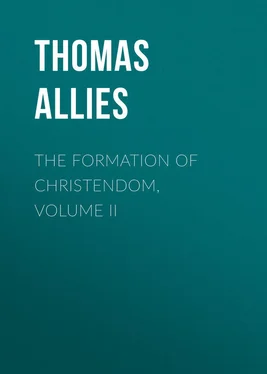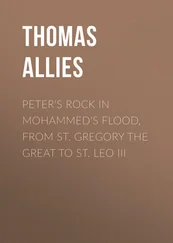Thomas Allies - The Formation of Christendom, Volume II
Здесь есть возможность читать онлайн «Thomas Allies - The Formation of Christendom, Volume II» — ознакомительный отрывок электронной книги совершенно бесплатно, а после прочтения отрывка купить полную версию. В некоторых случаях можно слушать аудио, скачать через торрент в формате fb2 и присутствует краткое содержание. Жанр: foreign_antique, foreign_prose, на английском языке. Описание произведения, (предисловие) а так же отзывы посетителей доступны на портале библиотеки ЛибКат.
- Название:The Formation of Christendom, Volume II
- Автор:
- Жанр:
- Год:неизвестен
- ISBN:нет данных
- Рейтинг книги:3 / 5. Голосов: 1
-
Избранное:Добавить в избранное
- Отзывы:
-
Ваша оценка:
- 60
- 1
- 2
- 3
- 4
- 5
The Formation of Christendom, Volume II: краткое содержание, описание и аннотация
Предлагаем к чтению аннотацию, описание, краткое содержание или предисловие (зависит от того, что написал сам автор книги «The Formation of Christendom, Volume II»). Если вы не нашли необходимую информацию о книге — напишите в комментариях, мы постараемся отыскать её.
The Formation of Christendom, Volume II — читать онлайн ознакомительный отрывок
Ниже представлен текст книги, разбитый по страницам. Система сохранения места последней прочитанной страницы, позволяет с удобством читать онлайн бесплатно книгу «The Formation of Christendom, Volume II», без необходимости каждый раз заново искать на чём Вы остановились. Поставьте закладку, и сможете в любой момент перейти на страницу, на которой закончили чтение.
Интервал:
Закладка:
T. W. Allies
The Formation of Christendom, Volume II
Preface
In the six chapters forming the first volume of this work I was engaged in describing the operation of Christianity, as it took the individual human soul for its unit, purified it, and wrought in it a supernatural life. I began with the consummation of the old world in its state of the highest civilisation united with the utmost moral degeneracy; I proceeded thence to the new creation of individual man; compared heathen with Christian man in the persons of Cicero and St. Augustine; drew out certain effects upon the world around of Christian life, as seen in those professing it, and viewed Christian marriage as restoring the primary relation between man and woman, and thus remaking the basis of human society, while the Virginal Life exhibited the crown and efflorescence of the most distinctive Christian grace in the soul.
I had thus, beginning with the stones of which the building is formed, reached the building itself; and the next thing was to consider the Christian Church in its historical development as the Kingdom of Truth and Grace: for while the soul of man is the unit with which it works, the word “Christendom” betokens a society founded in Christ, made by Christ, stamped with the image of Christ. It is the first great epoch of such a Kingdom of Truth and Grace, proceeding from the Person of its Founder, which I here attempt to delineate.
But not merely is the volume which I now publish a part only of a projected design; even as a part it is incomplete. It was my wish to finish this portion of my subject in one volume, which should reach to the great Nicene Council. But the treatment of the Greek Philosophy was too large for my limits, and so the last two chapters serve but as an introduction to the actual contact of that Philosophy with the Christian Church, which remains to be considered before I can complete my view of the Formation of Christendom in the ante-Nicene period.
Chapter VII. The Gods Of The Nations When Christ Appeared
“Emmanuel, Rex et Legifer noster, Expectatio gentium, et Salvator earum, veni ad salvandum nos, Domine Deus noster.”
Under the sceptre of the imperial unity were brought together a hundred different lands occupied by as many different races. That rule of Rome which had grown for many centuries with out, as it seemed, any presiding thought, by the casual accretions of conquest, may be said to assume under the hands of Augustus, about the year of Rome 750, certain definite and deliberately chosen limits, and to be governed by a fixed Idea, more and more developed in the imperial policy. The limits which the most fortunate of Roman emperors, nay the creator of the empire itself, put to it, were the Rhine and Danube, with the Euxine Sea, on the north; the deserts of Africa on the south; the Euphrates on the east; the ocean on the west. The Idea, which may indeed have been conceived by Julius, but was certainly first embodied by Augustus, was to change the constitution of a conquering city, ruled by an aristocratic senate, into a commonwealth governed by one man, the representative of the whole people; and the effect of this change, an effect no doubt unforeseen, at least in its extent, by its framer, was gradually to absorb the manifold races inhabiting these vast regions into the majesty of the Roman law, order, and citizenship. The three centuries which follow Augustus are occupied in working out the drama of this unity. During this time the provinces appear to come out more and more as parts of one whole. Some which at its commencement had only just entered the circle of Roman power and thought, as Gaul, become entirely interpenetrated with the law, language, customs, and civilisation of the sovereign city. Spain was nearly as much, and northern Africa perhaps even more Latinised: in all, local inequalities, and the dissimilarity arising from conflicting races, customs, and languages, are more and more softened down, though never entirely removed; and while throughout this period the great city continues the head, yet the body assumes an ever-increasing importance, until at length its members engage the equal solicitude of that central potentate to whom all equally belong. In the times of so-called Roman liberty, the plunder of lands which received pro-consuls for their annual rulers, served to replenish the fortunes of nobles exhausted by the corruption requisite to gain high office; but if the dominion of one at Rome seemed an evil exchange to a nobility which deemed itself born to enjoy a conquered world, at least it served as a protection to those many millions for whom the equality of law and order, the fair administration of justice, and the undisturbed possession of property, constituted the chief goods of life. Cicero and his peers might grieve over the extinction of what they termed liberty, but Gaul, Spain, Africa, and Asia exulted in deliverance from the oppression of a Verres, a Fonteius, a Gabinius, a Piso, or a Clodius, in the communication of citizenship, and in the peace of a common civilisation.
I. With a passing glance at the progress of this unity, which, great and magnificent as it is, is yet external, let us turn to an object filling the whole of this vast empire with its varied manifestations: for this object leads us to the consideration of another unity, wholly internal, without which that of government, law, and order must be apparent rather than real, or at best, however seemingly imposing, be deprived of the greater part of its efficacy.
1. It has been said that the empire contained in it many lands and many races, but these likewise worshipped their own distinct gods, which were acknowledged and sanctioned as national divinities for the several countries wherein they were locally established. Had Augustus ordered an enrolment not only of the numbers, the landed property, and the wealth of his subjects, but of their gods, his public register, or Breviarium, would have included at least ten distinct systems of idolatrous worship. First of all, there would be the proper gods of Rome, then those of the Hellenic race; and these, though the most similar to each other, yet refused a complete amalgamation. But besides these there were on the west the Etrurian, the Iberian, the Gallic, and the Germanic gods; on the east, the Carian and Phrygian, the Syrian, the Assyrian, the Arabian; on the south, the Phœnician, Libyan, and Egyptian. All these different races, inasmuch as they were subjects of the empire, enjoyed undisturbed the right of worshipping their ancestral gods, 1 1 Tertull. Apolog. xxiv, “Ideo et Ægyptiis permissa est tam vanæ superstitionis potestas, avibus et bestiis consecrandis, et capite damnandis qui aliquem hujusmodi Deum occiderint. Unicuique etiam provinciæ et civitati suus Deus est, ut Syriæ Astartes, ut Arabiæ Disares, ut Noricis Belenus, ut Africæ Cælestis, ut Mauritaniæ Reguli sui,” &c.; and Minucius Felix, Octavius vi., in like manner.
who, so long as they did not overstep their local boundaries, were recognised; they possessed priests, rites, temples, estates, and self-government; they held the soil, and their worship was legal. It was a matter of Roman policy not to interfere with them. Nay, their several worshippers could carry their rites along with them in their various sojourns and settlements, and even in Rome build altars, and adore Egyptian, Asiatic, African, or Gallic gods. These various systems agreed all in one point, that they were systems of polytheistic idolatry: they all divided the attributes of the godhead, assigning them to more or fewer objects, and worshipping all these by visible symbols which the power worshipped was deemed to inhabit: 2 2 See Aug. de Civ. Dei , l. viii. 24.
but they did not make the same division with a mere difference of name; on the contrary, they ran into and across each other with the most bewildering multiplicity, variation, and contradiction. Even in the same system, if we may give this name to any of the various mythologies, the several divinities were perpetually interfering with each other's province. When the Roman made vows for the removal of his ailments, in his uncertainty to which god the ailment belonged, or who was most proper to remove it, he addressed his vow to several together; or in public supplications, being often uncertain to whom exactly the prayer or offering should be made, he cautiously expressed himself, “whether it be a god or a goddess.” And the various Hellenic, Asiatic, or Egyptian cities often possessed local gods, whose worship was supreme there, while they exercised far less influence, or were even scarcely known elsewhere. 3 3 Döllinger, Heidenthum und Judenthum , pp. 528, 529.
Интервал:
Закладка:
Похожие книги на «The Formation of Christendom, Volume II»
Представляем Вашему вниманию похожие книги на «The Formation of Christendom, Volume II» списком для выбора. Мы отобрали схожую по названию и смыслу литературу в надежде предоставить читателям больше вариантов отыскать новые, интересные, ещё непрочитанные произведения.
Обсуждение, отзывы о книге «The Formation of Christendom, Volume II» и просто собственные мнения читателей. Оставьте ваши комментарии, напишите, что Вы думаете о произведении, его смысле или главных героях. Укажите что конкретно понравилось, а что нет, и почему Вы так считаете.












